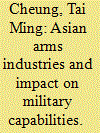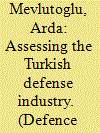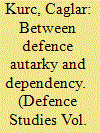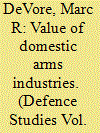|
|
|
Sort Order |
|
|
|
Items / Page
|
|
|
|
|
|
|
| Srl | Item |
| 1 |
ID:
153715


|
|
|
|
|
| Summary/Abstract |
This paper shows how alliance networks have affected defence industrialization policies and processes in countries in the Asia-Pacific region. In countries that enjoyed security assurances from the United States like Japan and South Korea, they are primarily focused industrialization and technology development in civilian sectors, and consequently, defence industrialization is a secondary priority. On the other hand, defence industrialization was/is of higher priority for states that face acute security threats such as China and the Democratic People’s Republic of Korea. In contemporary industrialization processes, the paper concludes that the preference between commercial and defence industrialization is now closing, leading towards an integrated model from which both sectors can benefit.
|
|
|
|
|
|
|
|
|
|
|
|
|
|
|
|
| 2 |
ID:
153713


|
|
|
|
|
| Summary/Abstract |
The reform process of Turkish defense industry as launched in the last quarter of the twentieth century has seen several achievements, as well as downfalls, and passed through major milestones. The resultant industrial structure is unique, compared to the other sectors in the country. Dominated by the TSKGV (Turkish Armed Forces Foundation), the major goal of the sector has always been involved in attaining self-sufficiency, indicative of an import substitution-oriented industry policy. This strategy is evident in decision-making and execution processes of virtually all defense procurement programs. However, lack of an efficient mechanism for science and technology policy-making mechanism, is observed as a major obstacle toward sustainable development of the sector. Although benefited from the overall economic take-off during the 2000s, today the Turkish defense industry faces to the challenge of sustainability, which is heavily dependent on export performance. The forthcoming period will test the sector, revealing the necessary coordination and communication by and between the military and civilian bureaucracies.
|
|
|
|
|
|
|
|
|
|
|
|
|
|
|
|
| 3 |
ID:
153711


|
|
|
|
|
| Summary/Abstract |
Turkish defence industries have significantly improved their production capabilities since the 1980s. According to the official documents, Turkey reached 54% local production level in 2011. Encouraged by this impressive defence industrial development, the government of Turkey declared that defence industrial autarky, the country’s main goal since the 1980s, would be reached by 2023. This paper evaluates the possibility of Turkey’s defence autarky. Contrary to the existing approaches in the literature that assess technological capabilities and cost-effectiveness, this paper argues that Turkey’s search for defence autarky is hindered by the interplay of institutional deficiencies, dependency on foreign inputs, and the United States’ continuing influence over Turkish politics.
|
|
|
|
|
|
|
|
|
|
|
|
|
|
|
|
| 4 |
ID:
153708


|
|
|
|
|
| Summary/Abstract |
Israel is currently one of the world’s leading exporters of defence goods and services. Its defence industries originated in the covert workshops of the Hagana and other resistance groups in the pre-independence era of the 1930s, supplying the pre-state armed forces with light weapons. Mainly relying on imported weapons, the French arms embargo in 1967 came as a shock to Israel’s leadership and public, causing a shift in policy towards self-sufficiency in major battlefield platforms (combat aircraft, armoured vehicles and warships) through indigenous research, development and fabrication. This policy of self-sufficiency was later modified to apply only to such weapons or systems that could not be obtained from abroad either for political or technical reasons. It can be expected that Israel defence industries now will focus more on sophisticated PGM’s and battlefield robotics, whilst the Government will strive to fully privatize the remaining state owned defence industries. How successful this will be remains to be seen.
|
|
|
|
|
|
|
|
|
|
|
|
|
|
|
|
| 5 |
ID:
153709


|
|
|
|
|
| Summary/Abstract |
Few issues are more important yet less understood than how the domestic production of armaments impacts military power. Scholars generally explain states’ drive to develop defense industries in terms of a quest for supply security. Technological changes are, however, rendering an “autonomy preference” increasingly unaffordable. This raises the question of whether states can still derive strategic value from their defense industries. This study addresses the issue by examining whether Israel’s and Serbia’s defense industrial bases contributes to either the traditional goal of supply security or the alternative objective of military adaptability. To preview the conclusion, the strategic value that most states can extract from domestic defense firms lies in enhanced military adaptability. This advantage is far from negligible. Since war is unpredictable, it is often the side that adapts most rapidly to unexpected circumstances that prevails. Domestic defense industries contribute significantly to adapt both because of their technical capabilities and their patterns of routinized cooperation with a states’ armed force. Supply security, by way of contrast, is today unattainable for all but the largest states.
|
|
|
|
|
|
|
|
|
|
|
|
|
|
|
|
|
|
|
|
|